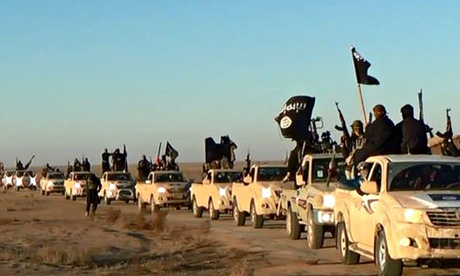
Isis fighters, pictured on a militant website verified by AP. Photograph: AP
***
ISIS: Islamic State in Iraq and the Levant
***
Who are Isis? A terror group too extreme even for al-Qaida
The Islamic State of Iraq in Syria (Isis) is so hardline that it was disavowed by al-Qaida's leader, Ayman al-Zawahiri.
Led by an Iraqi called Abu Bakr al-Baghdadi, Isis was originally an al-Qaida group in Iraq, the Islamic State of Iraq (ISI). As the Syrian civil war intensified, its involvement in the conflict was indirect at first. Abu Muhammad al-Joulani, an ISI member, established Jabhat al-Jabhat al-Nusra in mid-2011, which became the main jihadi group in the Syrian war. Joulani received support and funding from ISI and Baghdadi.
But Baghdadi sought to gain influence over the increasingly powerful Jabhat al-Nusra by directly expanding ISI's operations into Syria, forming Isis in April last year. Differences over ideology and strategy soon led to bitter infighting. Isis turned to out to be too extreme and brutal not just for Jabhat al-Nusra, but for al-Qaida itself, leading to a public repudiation by Zawahiri, who last month called on Isis to leave Syria and return to Iraq.
By then Isis, also known as the Islamic State of Iraq and the Levant, had lost ground in Syria to Jabhat al-Nusra and its allies. But any notion that Isis is a spent force has been shattered by its capture of Mosul, Iraq's second largest city. Isis now controls territory that stretches from the eastern edge of Aleppo, Syria, to Falluja in western Iraq and now the northern city of Mosul.
Isis has shown its ruthlessness and brutality in the areas of Syria under its control, eastern Aleppo and the city of Raqqa. It was blamed for the February killing of a founding member of the Salafi group Ahrar al-Sham and the group's leader in Aleppo, Muhammad Bahaiah, who had close connections with senior al-Qaida leaders. It was also blamed for the assassination of Jabhat al-Nusra's leader in the Idlib governorate, Abu Muahmmad al-Ansari, along with his wife, children and relatives. It ordered the crucifixion of a man accused of murder; other forms of punishment include beheadings and amputations.
Despite its brutal reputation, Isis has shown flexibility as well in Iraq to win over disaffected Sunnis in the north against the Shia-led government of Nouri al-Maliki. Mushreq Abbas, who writes on Iraq for the Al-Monitor website, describes how Baghdadi has presented himself as an alternative to the Sunni political class tribal leaders and moderate clerics who oppose central government.
"Until now, Baghdadi's fighters have not harmed religious men … when the tribes refused to raise Isis banners in Falluja, he ordered his fighters not to raise the banner and try to co-opt the fighters of armed groups, clans or religious men," says Abbas.
Unlike the Iraqi troops facing them Isis fighters are highly motivated, battle hardened and well-equipped, analysts say.
"It also runs the equivalent of a state. It has all the trappings of a state, just not an internationally recognised one," Douglas Ollivant of the New America Foundation, told the Washington Post.
It runs courts, schools and services, flying its black-and-white flag over every facility it controls. In Raqqa, it even started a consumer protection authority for food standards.
Isis has bolstered its strength by recruiting thousands of foreign volunteers in Syria, some from Europe and the US, and is estimated to have more than 10,000 men under its control. As for resources, it counts large extortion networks in Mosul that predates the US withdrawal and in February it seized control of the financially valuable Conoco gas field, said to be worth hundreds of thousands of dollars a week, from Jabhat al-Nusra in Deir Ezzor, in Syria.
Now that it has captured Mosul, Isis is in an even stronger position to bolster its claim that it is the leading jihadi group.
"Isis now presents itself as an ideologically superior alternative to al-Qaida within the jihadi community and it has publicly challenged the legitimacy of al-Qaida leader Ayman al-Zawahiri," said Charles Lister, a visiting fellow at the Brookings Institution, Doha, in a paper last month. "As such it has increasingly become a transnational movement with immediate objectives far beyond Iraq and Syria."
No comments:
Post a Comment